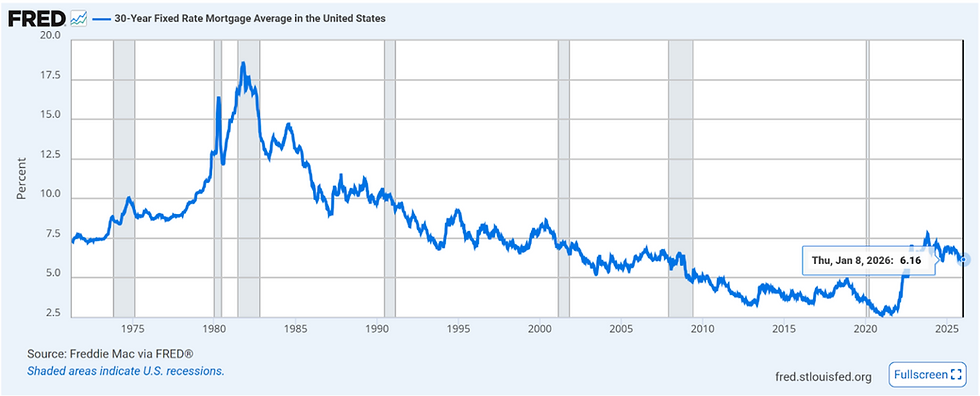Interest Rates and Housing Prices: Q2 2024
- Jen Berbas

- Dec 12, 2023
- 4 min read
Updated: Oct 27, 2025
In Austin, Texas, where housing costs have been increasing over the long term, one crucial factor is interest rates and how they affect the housing market. We break down the complex relationship between interest rates and housing prices, helping you understand how it impacts your path to homeownership.

Interest Rates 101:
Interest rates are the cost of borrowing money, and they play a significant role in the real estate market. The Fed Funds rate is set by the Federal Reserve, and this has a derivative effect on mortgage rates. The Fed doesn’t set mortgage rates, banks do, but they base their risk tolerance and, thus, the rate of the mortgages they sell based on their opinion of the market and based on what they think the Fed will do in the future.
When the economy is strong, interest rates tend to rise, and when it's weak, they tend to fall.
How Interest Rates Influence Housing Prices:
Generally, when interest rates are low, housing prices go up, and when interest rates rise, they have a dampening effect on housing prices.
Mortgage Affordability:
One of the most direct ways interest rates impact the housing market is by affecting mortgage affordability. When interest rates are low, borrowing money to buy a home becomes more affordable. Lower rates mean lower monthly mortgage payments, making homeownership more accessible to a broader range of people, including renters looking to transition into homeowners.
Supply and Demand:
Lower interest rates often stimulate demand for housing. When more people can afford to buy homes, the demand for properties goes up. In a market like Austin, this increased demand can drive up housing prices. High demand coupled with limited supply can lead to bidding wars and higher sale prices.
With rising interest rates of 2023, housing prices have declined but the cost of borrowing money has increased. If a buyer thinks that interest rates may decline in the following few years, they may see this decrease in prices as an opportunity to purchase, with the plan on refinancing later when rates decline.
Investor Activity:
Low interest rates can also attract real estate investors. These investors may purchase properties to rent them out, which can reduce the available inventory of homes for sale. In Austin, where demand is strong, this can further increase housing prices. In 2021 it is estimated that 40% of purchases were investor purchases in contrast to only 20% of investor purchases in the previous year. With the higher rates of 2023, investor interest has abated some.
Austin's Housing Market Dynamics
Now, let's put this knowledge into the context of Austin's housing market:
Market trends: Austin's housing market has been red-hot in recent years. It consistently ranks among the fastest-growing cities in the United States, attracting tech companies and young professionals. As interest rates have increased, the pricing has cooled giving some buyers an opportunity to lock in lower prices.
Limited Inventory: The supply of homes in Austin hasn't kept up with the demand, leading to a seller's market. High demand, low inventory, and low-interest rates have combined to push up housing prices significantly. In 2023 with higher interest rates, the lower inventory has unexpectedly continued creating some contradictory market indicators.
What Does This Mean for You?
As a renter in Austin, understanding how interest rates impact housing prices is crucial for planning your transition to homeownership:
Timing Matters: Keep an eye on interest rate trends. When rates are low, it might be an excellent time to start exploring homeownership. Locking at a low rate can save you money over the life of your mortgage. Conversely, with the higher rates, you may be able to lock in a lower price if you think that rates may come down in the future, allowing you an opportunity to refinance in the future, bringing down your monthly payments.
Budget Wisely: While low rates can make homeownership more accessible, don't forget to consider all costs involved, including property taxes, insurance, and maintenance. Ensure you're financially prepared for homeownership.
Market Research: Research the Austin market thoroughly. Understand the neighborhoods you're interested in and monitor property listings. Be ready to act swiftly when you find a suitable home. It is wise to start watching the market long before you are ready to buy. We have started many clients off on their search a year or more prior to their actual purchase timeline.
Get Pre-Approved: Before you start your home search, get pre-approved for a mortgage. This not only helps you understand your budget but also strengthens your position when making offers.
Consider Professional Help: In a competitive market like Austin, working with a local real estate agent can be invaluable. They have insights, connections, and negotiation skills to help you secure your dream home and walk you through the complicated process.
The relationship between interest rates and housing prices in Austin, Texas, is a complex one. As a renter with dreams of homeownership, understanding this relationship is vital. Keep a close watch on interest rate trends, manage your finances wisely, and be prepared to act strategically in Austin's competitive housing market. With the right timing and preparation, you can turn your dream of homeownership into a reality in the vibrant and thriving city of Austin.
Thanks for spending this time with us!
We are delighted to be your guides to real estate and always happy to nerd out of the details with you!
Jen & the team





Comments